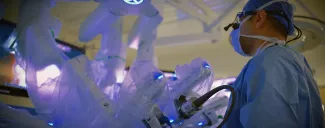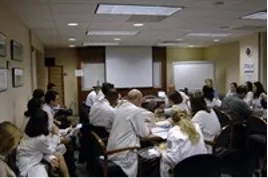Patient Center

Why UCSF for Hepatobiliary & Pancreatic Surgery?
Team Approach
Rather than isolated silos of care, we have a team approach, which makes a big difference in the overall care of the patients. Among competing therapies, patients always recieve the optimal one, regardless of which medical practice offers it. Working collaboratively, surgeons, medical oncologists, and radiation oncologists develop highly individualized treatment plans supported by state-of-the-art imaging and pathology services, nurses, and other health professionals.
Leading Center of Excellence
The UCSF Medical Center and UCSF Helen Diller Family Comprehensive Cancer Center are premier hospitals, each ranking among the top ten (10) in their respective classes according to the the well-regarded U.S. News & World Report annual survey. UCSF, a leading cancer referral center, offers a wide array of surgical options that are often not available in a community setting.
Expertise in Complex Cases
Cancer surgeons at UCSF are known for their willingness to treat high-risk cancer patients including those routinely turned down for surgery at other institutions. Patients frequently seek second opinions from our surgeons, who are also physician-scientists testing the latest treatments in clinical trials.
Comprehensive State-of-the-Art Pain Management
UCSF's Pain Management Team provides 24/7, around-the-clock post-surgical pain management including epidural anesthesia, a state-of-the-art approach available at UCSF, but not at every hospital.
Minimally Invasive Surgery
UCSF surgeons were among those who helped pioneer minimally invasive gastrointestinal cancer surgery, also known as laparoscopic and robotic surgery. Unlike a traditional open procedure which uses large incisions, surgeons make three small 1-inch incisions and insert a laparoscope, a lighted tube and video camera, and operate using miniaturized specially manufactured surgical instruments.The camera transmits images of the operative field back to a computer monitor, guiding the surgeons as they manipulate the instruments. The advantages of minimally invasive surgery are:
- Less post-operative pain
- Reduced risk of Infection
- Shorter hospital stays
- More rapid return to normal activities
Although less invasive, these surgeries are complex and intricate, and require a high level of expertise. At UCSF, surgeons perform a high volume of laparoscopic gastrointestinal procedures.
The Latest in Surgical Innovation
- Microwave ablation of unresectable liver tumors
- Arterial infusion chemotherapy
- Liver-sparing surgical techniques
Clinical Trials
UCSF offers patients access to a broad menu of clinical trials for the most promising new therapies. Our physicians are members of the leading cooperative groups including Cancer and Leukemia Group B (CALGB), the American College of Surgeons Oncology Group (ACOSOG), Society of Interventional Radiology (SIR), and the Radiation Therapy Oncology Group (RTOG) and often serve as Principal or Co-Investigators on important studies.
Tumor Board Conference

